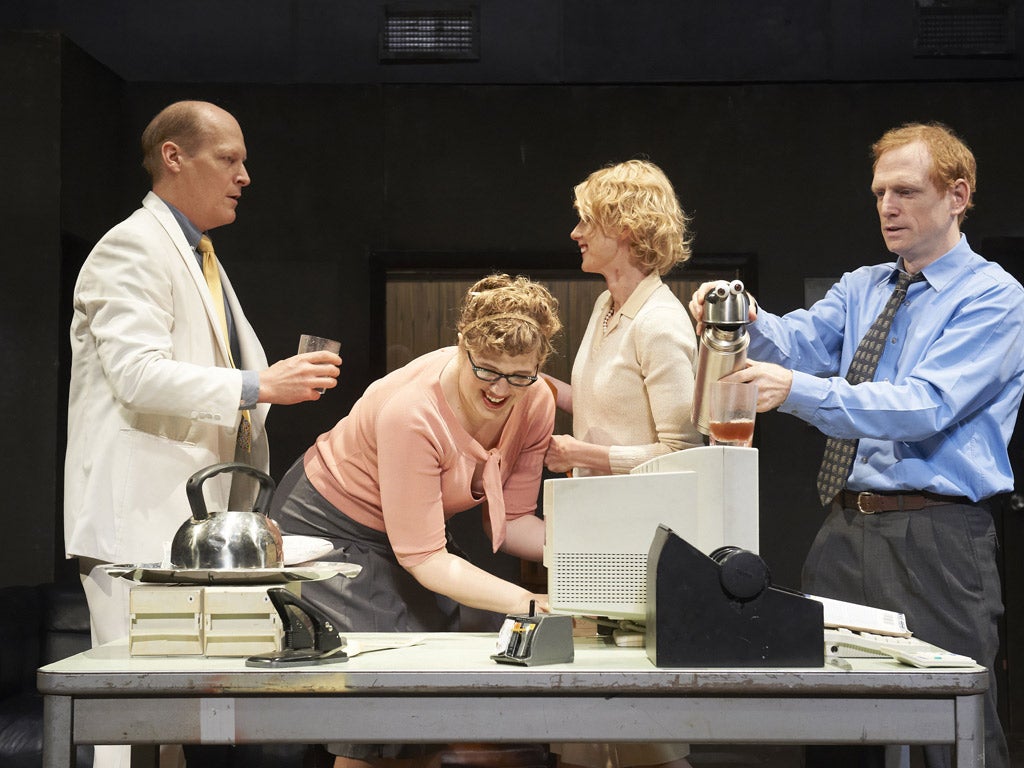Gatz, Noel Coward Theatre, London Torch Song Trilogy, Menier Chocolate Factory, London The Witness, Royal Court Upstairs, London
There's an absorbing, slow-burn melancholy to this eight-hour reading of F Scott Fitzgerald's elegant prose

Where's the glamour, you may well ask. At the start of Gatz, the inhabitants of Long Island appear to be stuck in a drear office – a warren of flickering strip lights and grey filing cabinets. Yet this eight-hour staging of The Great Gatsby is absorbing, transferred from New York to the West End for the London International Festival of Theatre (Lift).
Set in America in the Roaring Twenties, F Scott Fitzgerald's novel describes the high life of the super-rich between the Great War and the Great Depression. His narrator, Nick, recalls an intriguing but ill-fated summer on Long Island, spent with his glamorous cousin Daisy, her deceiving husband, Tom, and her old flame, Gatsby. A dark horse with shady business connections, Gatsby owns a mansion where he hosts parties awash with champagne.
What's extraordinary is how this staging – by Obie-winning company Elevator Repair Service – not only shuns visual opulence but resists fully dramatising the novel. Gatz is essentially a cover-to-cover reading of Fitzgerald's elegant prose by actor Scott Shepherd.
He plays a bored white-collar worker who – while waiting for his malfunctioning computer to boot up – finds a tattered copy of The Great Gatsby amid the junk on his desk. Idly starting to read it aloud, he becomes absorbed. Wandering past with cups of coffee or trying to get him to sign documents, his co-workers start playing Fitzgerald's other characters, as if joining in the would-be escapist dream.
The cast slides between the different levels of pretending with tongue-in-cheek humour, helped by evocative sound cues. A bullish deputy manager stomps in to answer the phone that Scott is ignoring, only to deliver a line allotted to Tom in the book, right on cue. The low-budget inventiveness becomes a charming joke, too, as when the novel describes a drunk pranging his car and a lone tyre is glimpsed, bouncing down the corridor upstage.
The snag is that the office relationships are underdeveloped and there's a kind of Brechtian alienation at work (every exchange being punctuated with "he said" and "she said"). One starts to feel the emotional surface is only skimmed, particularly by contrast with Rattigan's interwar heartbreaker, After the Dance, recently at the NT.
Still, Gatz, with its slow-burn melancholy, is well worth seeing, and should make an interesting contrast with Baz Luhrmann's megabucks Gatsby movie, coming soon.
Meanwhile, in Torch Song Trilogy – Harvey Fierstein's portrait of the late-1970s New York gay scene – Arnold looks fit to vie with the flappers of Fitzgerald's era. In Menier's revival, David Bedella's pert Arnold – a part-time drag queen – is slipping into a sequinned sheath dress. Tipping us a heavily made-up wink, he flashes back to how he first dipped a toe – or rather more – in the underground nightclub scene. Cue a load of farcically mimed, wide-eyed bonking in a backroom orgy. But Arnold is a romantic at heart. He falls for a closet bisexual (Joe McFadden), then a promiscuous pretty boy (Tom Rhys). In the end, he rises above testy love triangles, a personal tragedy and his mother's homophobia, to adopt a kid and, with luck, find everlasting love.
Woefully, though, Fierstein's play has not stood the test of time, the dialogue now sounding alternately slushy and wisecracking. Douglas Hodge's unconvincing production is particularly disappointing, since he himself was adorably droll here not so long ago, in Fierstein's La Cage aux Folles.
In The Witness, adopting a child proves no easy ride for Joseph, a war photographer who rescued the lone survivor of a massacre in Rwanda in the 1990s. He brought the baby girl, Alex, home and now she's a Cambridge undergrad. But Joseph's wife has died, uncomfortable truths have been cropped out of the picture, and Alex wants to investigate her roots.
In this impressive second play by Vivienne Franzmann, there are a few over-explanatory speeches, but the revelations are sharply disturbing. Simon Godwin's production is beautifully acted, with nicely observed humour and mounting tension.
'Gatz' (0844 482 5141) to 15 Jul. 'Torch Song Trilogy' (020-7378 1713) to 12 Aug. 'The Witness' (020-7565 5000) to 30 Jun
Critic's Choice
Gregory Doran, the RSC's artistic director designate, translates Julius Caesar to modern-day Africa with a superb ensemble of black British actors, at the RST in Stratford-upon-Avon (to 7 Jul). Meanwhile, in west London, the Print Room reprises its in-the-round, intimate Uncle Vanya (18 Jun to 7 Jul), with an outstanding central performance by Iain Glen.
Subscribe to Independent Premium to bookmark this article
Want to bookmark your favourite articles and stories to read or reference later? Start your Independent Premium subscription today.

Join our commenting forum
Join thought-provoking conversations, follow other Independent readers and see their replies